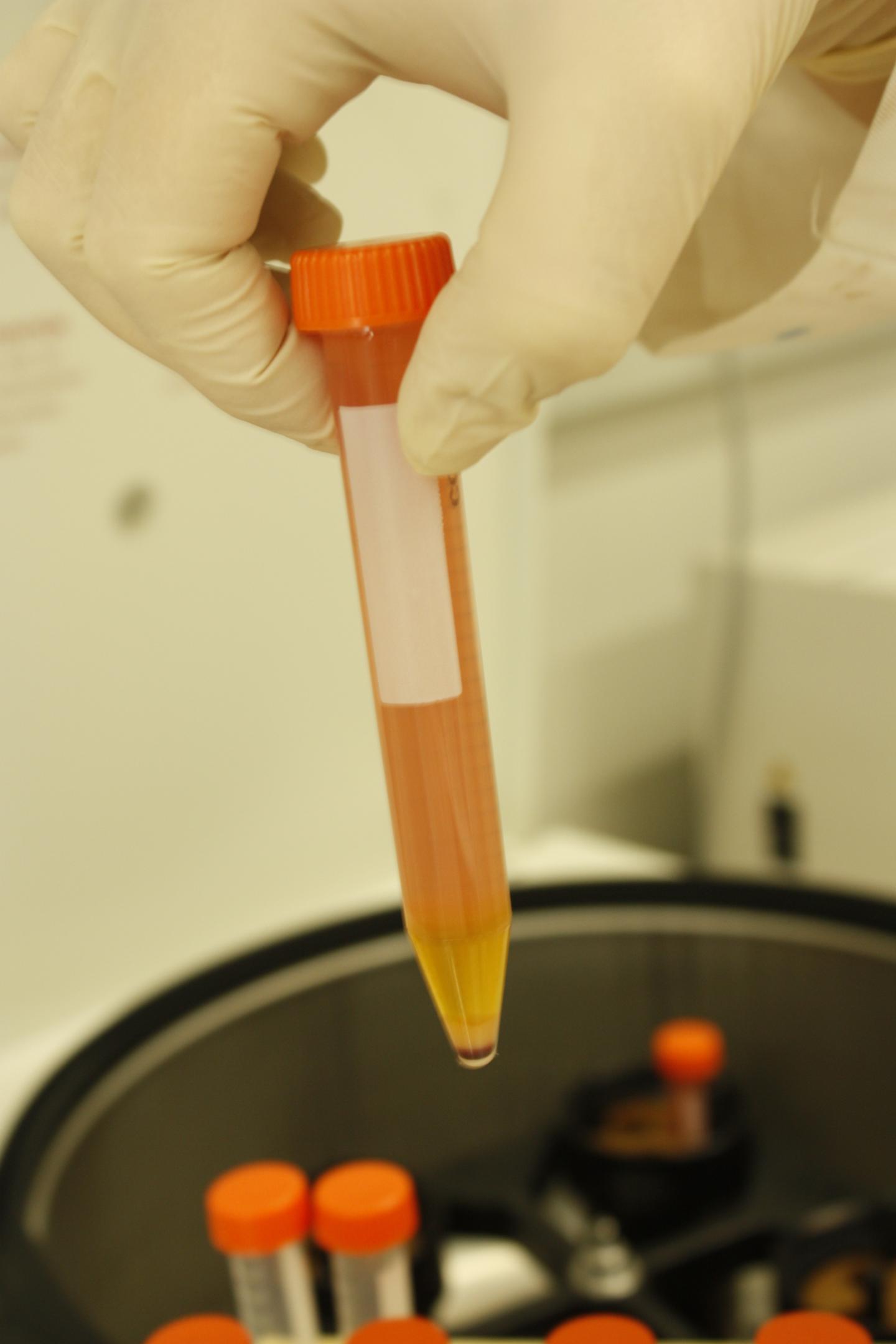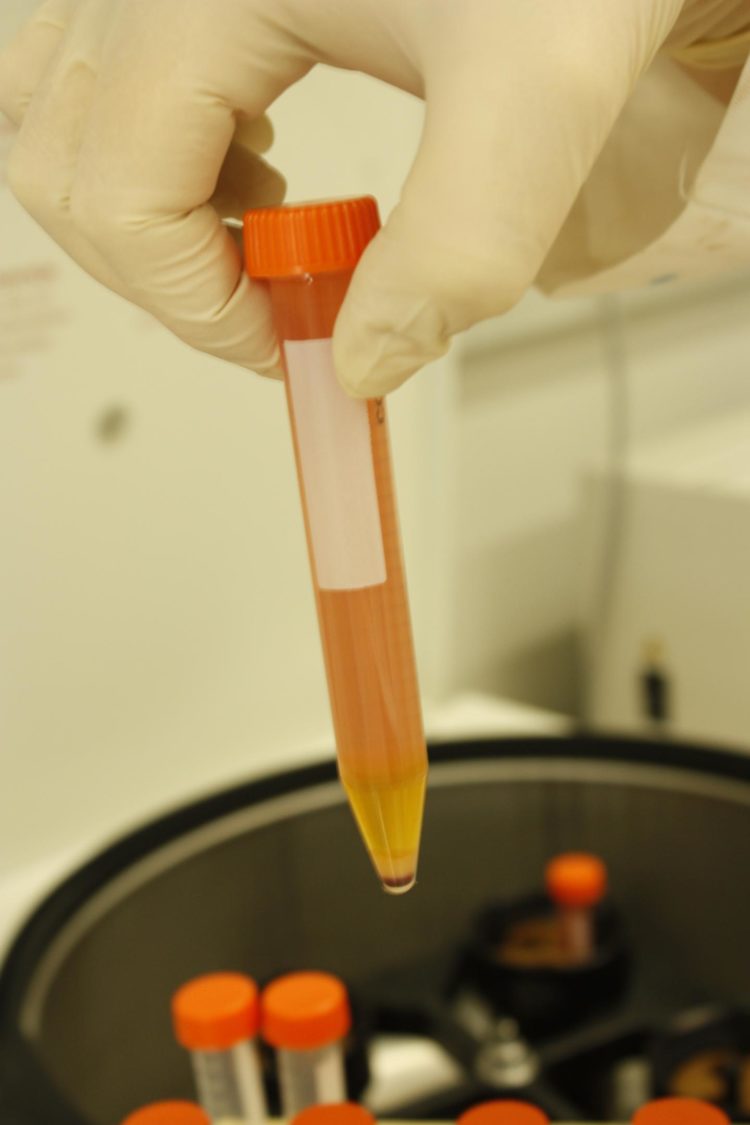A research team at INRS studies the effects of antidepressants on the placenta

Credit: Cathy Vaillancourt laboratory (INRS)
Montreal, January 8 2020 — About one in ten women in Québec will suffer from depression during pregnancy. Without treatment, the illness carries risks for both mother and child. Yet antidepressants are not without consequences for fetal development. The team of professor Cathy Vaillancourt at the Institut National de la Recherche Scientifique (INRS) is studying the effects of these drugs in order to identify the least harmful ones.
Professor Vaillancourt, in collaboration with the teams of Professors J. Thomas Sanderson and Nicolas Doucet of the INRS, has just modelled for the first time the interaction of commonly used antidepressants with estrogen, and more specifically with the enzyme that synthesizes the estrogen: aromatase. It is an important contribution, since estrogen production is essential to the development of the fetus and to the mother’s physiological adaptation during pregnancy. The results of their study were recently published in The Journal of Steroid Biochemistry and Molecular Biology.
Prescribing antidepressants for pregnant women is controversial. Studies show that, when administered to mothers during pregnancy, some of these treatments are associated with a risk of heart and lung malformations in newborns. Others are thought to result in impaired cognitive development, including autism, in children.
Estrogen as a target for antidepressants
The harmful effects of antidepressants are thought to be due to their interaction with certain key hormones. Most antidepressants prescribed to pregnant women target serotonin, a hormone produced both in the brain and, as shown by Professor Vaillancourt’s team in 2017, in the placenta. This is the family of antidepressants called selective serotonin reuptake inhibitors (SSRIs) such as Zoloft, Celexa or Prozac. However, estrogen would also be targeted by these treatments.
“We wanted to see how the antidepressants that have been developed to block the serotonin transporter also affect aromatase. Using molecular models, we found that all the antidepressants we analyzed seemed to be able to bind directly to the enzyme and regulate its activity. This remains to be confirmed and the precise mechanism needs to be further investigated,” reports Cathy Vaillancourt, lead author of the study.
Her doctoral student tested the effect of different types of antidepressants on placenta samples collected after delivery. “The antidepressants we chose to test are those most commonly prescribed in pregnant women, namely sertraline (Zoloft), venlafaxine (Effexor), fluoxetine (Prozac), paroxetine (Paxil), and citalopram (Celexa),” says Andrée-Anne Hudon Thibeault “By comparing different doses and molecules, we were able to uncover some of their specificities.”
By observing the effects of antidepressants on the placenta’s hormonal system, the team can determine in advance if there will be a risk for the fetus. “Fetal development is strongly linked to the placenta. Every healthy fetus has a healthy placenta,” maintains Vaillancourt.
Safer antidepressants
Not all types of antidepressants have these harmful effects. Not all pharmacological molecules have the same hormonal affinity. “Depending on its form, a molecule may not interact the same way with estrogen and may therefore be less harmful to the developing fetus,” asserts Professor Vaillancourt, who specializes in the involvement of maternal exposure to environmental and drugs factors in the endocrinology of the human placenta.
It’s more a matter of the pharmacological molecule being administered and the dosage. “By testing several types of antidepressants at varying doses, our work will contribute to better choices regarding the type of antidepressant and the dose prescribed for pregnant women, while minimizing the side effects on the course of pregnancy and on fetal development,” says Andrée-Anne Hudon Thibeault, primary author and recent PhD graduate of INRS.
Discontinuing medication isn’t always advisable. Depression can have serious consequences if left untreated. “Depression is one of the leading risk factors for suicide in pregnant women,” says Vaillancourt. “Some studies suggest that depression can also compromise fetal development, due in part to poor lifestyle habits.”
At the same time, Professor Vaillancourt is collaborating with a team of researchers in Vancouver who are studying a cohort of pregnant women and following their children over the long term. “This will give us a nice map of the various effects in women and the consequences for children’s heart and brain development,” says Vaillancourt. “We’re still in the early stages of the project, but I’m confident that some antidepressants are safer and others can be developed for use during pregnancy.”
###
About the study
Serotonin and serotonin reuptake inhibitors alter placental aromatase by Andrée-Anne Hudon Thibeault, Yossef López de los Santos, Nicolas Doucet, J. Thomas Sanderson et Cathy Vaillancourt was published in The Journal of Steroid Biochemistry and Molecular Biology. DOI : https:/
This research was supported by funding from March of Dimes and the Natural Sciences and Engineering Research Council of Canada (NSERC).
About the INRS
The Institut National de la Recherche Scientifique (INRS) is the only institution in Québec dedicated exclusively to graduate level university research and training. The impacts of its faculty and students are felt around the world. INRS proudly contributes to societal progress in partnership with industry and community stakeholders, both through its discoveries and by training new researchers and technicians to deliver scientific, social, and technological breakthroughs in the future.
Contact : Audrey-Maude Vézina, Communications, INRS, 418 687-6403 (office), 418-254-2156 (cell), [email protected]
Media Contact
Julie Robert
[email protected]
514-971-4747
Related Journal Article
http://dx.





